Serendip is an independent site partnering with faculty at multiple colleges and universities around the world. Happy exploring!
From biological evolution to emergence: meaning, culture, and esthetics
Biological evolution: Darwin and beyond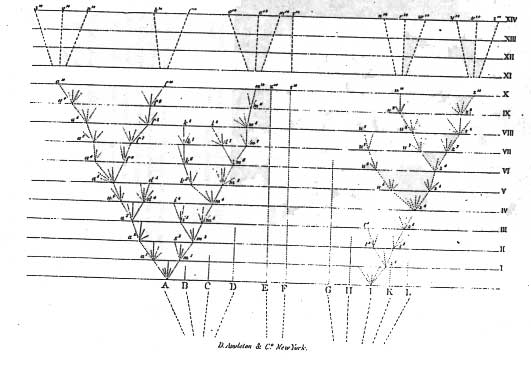
- diversity/adaptation from descent with variation and differential reproductive success
- categories based not on essential characteristics but on ancestry; variability in present and past is fundamental; randomness the grist for all order (physics, thermodynamics, life, human understanding)
- order reflects continuous small changes but there are also more abrupt larger changes
- differential reproductive success is context-dependent, and the context itself is variable, both because of changes in the non-living world and because of changes brought about by the process of biological evolution itself
- biological evolution is not, cannot be moving toward perfection ("survival of the fittest" is tautological); it is instead a process of exploring possible new forms of living organisms, a process in which past explorations provide the foundations from which new forms can come into existence
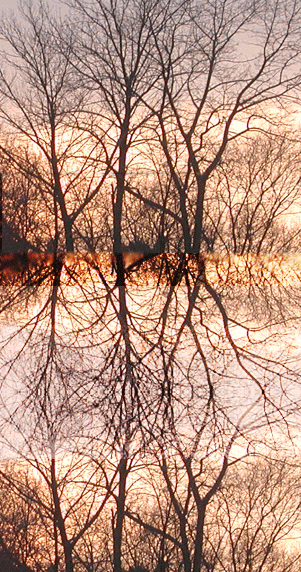
- biological evolution is as much dependent on interdependence as it is on competition
- biological inheritance is not the only mechanism of evolutionary change
- lateral spread of genetic information
- impacts of individual and social behavior on differential reproductive success
- individual and cultural change itself
How do we think of individual change, of culture and cultural change? Is it all genetic inheritance or is there something different/more involved?
"Psychology will be based on a new foundation, that of the necessary acquirement of each mental power and capacity by gradation. Light will be shown on the origin of man and his history." ... Darwin, Origin of Species
"[Evolution] is a dangerous idea. My admiration for Darwin's magnificent idea is unbounded but I, too, cherish many of the ideas and ideals that it seems to challenge, and want to protect them ... I want to protect the campfire song, and what is beautiful and true in it ... The only good way to do this is to ... is to cut through smokescreens and and look at the idea as unflinchingly, as dispassionately, as possible" ... Daniel Dennett, Darwin's Dangerous Idea, pp 21-22
"There is no denying, at this point, that Darwin's idea is a univeral solvent, capable of cutting right to the heart of everything in sight. The question is what does it leave behind? I have tired to show that once it passes through everything, we are left with stronger, sounder versions of our most important ideas. Some of the traditional details perish, and some of these losses are to be regretted, but good riddance to the rest of them. What remains is more than enough to build on." .... Daniel Dennett, Darwin's Dangerous Idea, pp 521
Is Dennett successful? Is it an adequate extension of a non-foundational narrative story? Are we happy with it? If not, why?
The relation between evolution as a non-foundational narrative story and science
| Linear science | Seriously loopy, story teling science |
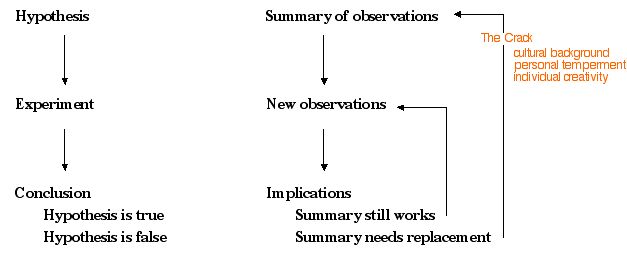
|
|
| Science as successive approximations to Truth
Non-narrative? |
Science as ongoing story telling and story revision: repeated making of observations, interpreting and summarizing observations, making new observations, making new summaries ... individually and collectively Science as skepticism, a style of inquiry that can be used for anything, one which everybody is equipped to to/can get better at/be further empowered by, and contribute to - a way of making sense of what is but even more of exploring what might yet be Narrative? (see The Nature of Science) |
Where in biological inheritance is the "crack"? "personal temperment," "individual creativity," "cultural background" Are these simply direct consequences of biological inheritance, some of the "traditional details" that need to "perish," "losses to be regretted," or something more? And, if something more, do we need to look elsewhere for them or can they be accounted for within a non-foundational story that Darwin helped initiate?
Looking elsewhere for selves and cultures ...
Finding selves and cultures (plus) within evolution = emergence
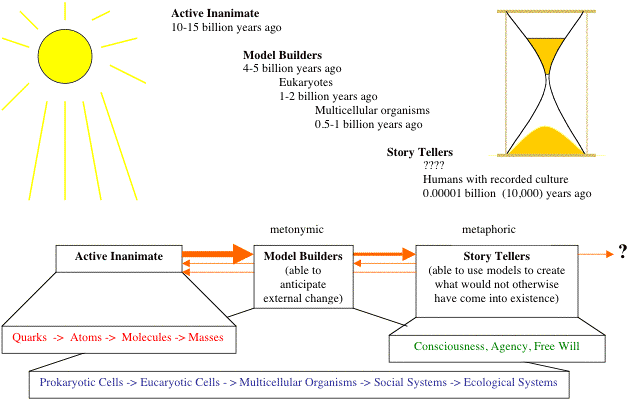
Individuals and cultures (including meaning and intention) don't disappear, don't exist in some different parallel world, were not present at the beginning ...
They are instead themselves outcomes of an evolutionary process and,
once having come into being,
they in turn become causal influences in that process.
Humans share with all other living organisms the wherewithal to explore forms of life,
and can do so as well though story telling
The story telling brain as a new development in evolution
 |
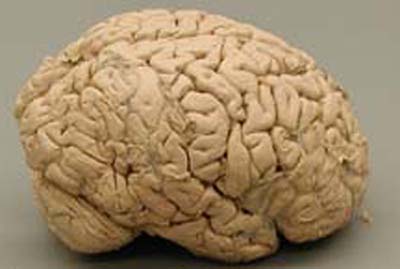 |

|
 |
Neocortex gives us the capacity to tell stories, to go beyond experiences, to conceive/explore/bring into existence new worlds, to create meaning out of randomness



Comments
Evolution, Culture And Mechanisms
Evolution, Culture And Mechanisms
And Required 2010 Introspection
A. From "Evolution, The Drive Behind The Mechanisms"
http://www.the-scientist.com/community/posts/list/240/122.page#4603
For 21st century Science evolution is all about and in Mechanisms. For the present "scientists"
it is The Mechanisms that drive and move things, which is what they consider evolution.
Factually, however, again and again, Life's is the ubiquitous cosmic evolution mode. The origin and nature of cosmic evolution is the origin and nature of life's evolution, and it is evolution that is the drive behind developing mechanisms.
B. Evolution is "attaining temporary augmented energy constraint", per
"Physical Evolution Defintion"
http://www.the-scientist.com/community/posts/list/220/122.page#4368
"attaining temporary augmented energy constraint in successive generations with energy drained from other mass formats, to temporarily postpone, survive...", so that the more the attained energy constrained the longer is the survival.
C. Culture is the gear that couples Evolution with mechanisms
Culture is the total mode of responses of organisms to their environment and circumstances, per
"Culture And Intelligence Of Living And Inanimate matter"
http://www.the-scientist.com/community/posts/list/80/122.page#1201
The tools of the modes of responses are the Mechanisms, the technologies.
D. And, BTW, this is why "Prsdnt Obama Should Consider An Overdue Introspection"
http://www.the-scientist.com/community/posts/list/160/122.page#2388
Prsdnt Obama, his advisers and all of us should internalize that it's not just the economy that collapsed. Not just the financial system-policies. It's the 20th century technology culture that collapsed. We and the rest of the world not only have not yet internalized our cultural collapse, but are persistently striving against basic rationalism, against scientism, to reinvigorate the terminally ill technology culture, its values and its economy. We're all striving to reinvigorate the technology culture with Mechanisms, with money printing plus "tighter rules and regulations".
This will NOT WORK. It will not work simply because Mechanisms do not tackle the causes of the collapse, the greed culture, its mentality and ethics. Present technology culture humanity is conditioned to bypass all rules and regulations on its race after greed.
Again, it is vitally important for charting the future course of our society to learn and understand, to analyse and assess, with a scientism perspective, the evolution and collapse of the Technology Culture and the implications, within it, of the bare survival of basic classical science, of the further comprehension of our place and fate in the universe. Again, it is vitally important for charting the future course of our society to embark on a long course to a new, science-based, more rational, virtual reality culture.
Dov Henis
(Comments From The 22nd Century)
Updated Life's Manifest May 2009
http://www.the-scientist.com/community/posts/list/140/122.page#2321
28Dec09 Implications Of E=Total[m(1 + D)]
http://www.the-scientist.com/community/posts/list/184.page#4587
Cosmic Evolution Simplified
http://www.the-scientist.com/community/posts/list/240/122.page#4427
Post new comment